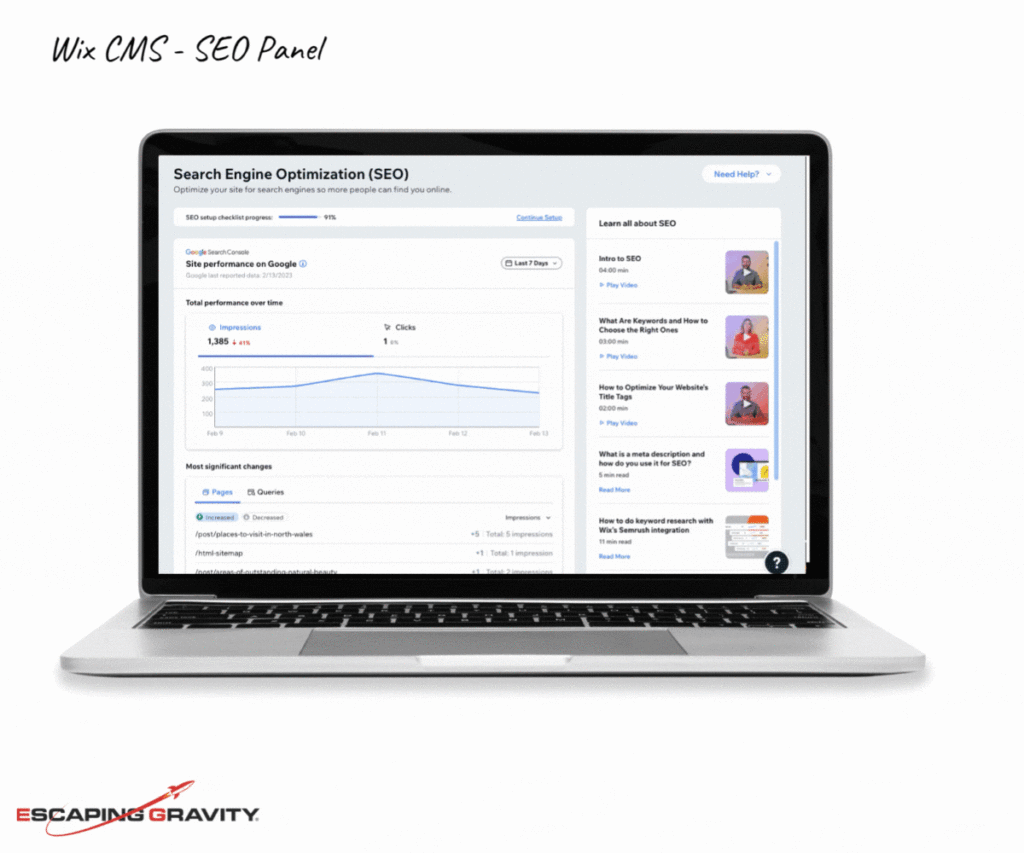Choosing the right CMS for SEO can be a crucial foundation for organic search success. As an SEO Consultancy we work across all the major CMS platforms including Shopify, WordPress, Wix and Magento – plus a growing number of bespoke builds.
From our experience, we have put together a list of the Best CMS for SEO based on different business types.
Best CMS for small e-Commerce
Shopify is the best CMS for SEO if your brand has less than c. 50,000 SKUs. Launched in 2006, Shopify provides an ‘out of the box’ structure providing a solid foundation for SEO in a short space of time. For most themes, there is a basic SEO element included, allowing you to customise titles and descriptions and providing a clear sitemap.xml. Additional plugins can help further enhance the SEO if used correctly.
As an all in one solution, there are no issues with hosting and a CDN from Cloudflare is standard.
As a Shopify partner, we have extensive experience and success with Shopify SEO. We also run our own Shopify website – the One Edit (one of our Pioneer Websites) – that allows us to test new ideas and approaches.
Best CMS for large e-Commerce
Magenta (now Adobe Commerce) Founded in 2008, Magento rapidly grew to become one of the leading e-commerce platforms in the world. Whilst Shopify may have snapped up much of the startup/DTC e-commerce attention, this PHP platform has much to offer as the best platform for large e-commerce.

Magento 2 was released back in 2015 which was a major upgrade in the planform’s capability with improved performance, enhanced security and a better CMS. (At the time of writing Magento 2.4.6 will be released in March 2023.)
As part of the Adobe product suite, Magento will connect seamlessly into a wide range of SEO tools and insights that can help deliver an integrated marketing solution.
The challenges with this platform include the need for dedicated hosting and technical ‘know how’ to ensure all elements of the SEO are in tune making it a more considered and potentially more expensive option for e-commerce SEO.
Best CMS for Editorial SEO
In our opinion, WordPress remains the leading CMS for editorial content. Whilst e-commerce can be added with WooCommerce, we still think it is great for presenting and optimising great content. A free CMS, WordPress does not come with hosting (unless you want to use wordpress.com which is slightly different) but there are plenty of ‘one click installs’ to get you up and running quickly.
With an almost unlimited number of professional templates, WordPress can be easily tailored to best present your editorial vision. Again, with plugins you can further expand the content to include relevant editorial schema, or connect with Google news.
However, the flexibility of plugins also points to a potential risk for security and for SEO. Too many plugins could slow the website down, impacting core web vitals, whilst out of date plugins increase the risk of hacking.
We have well over a decade of WordPress SEO experience, across Escaping Gravity and our previous companies. Our WordPress client projects have included Club Oenologique whilst we also run our own Pioneer Website – Virtual Wanderlust – on the WordPress CMS.
Best CMS for Travel SEO
The WIX CMS continues to impress as it rapidly matures to become a major rival to WordPress. We have seen great success for Travel SEO on Wix, including for our own Pioneer website, Cottage Decisions.
An ‘all in one’ CMS, a Wix site includes hosting as part of the package. It includes a number of SEO tools and connections ‘built in’ as opposed to additional plugins for similar features on WordPress.

Every site installation includes a dedicated toolset for SEO, complete with insightful guides on a wide range of topics form their SEO learning Hub.
Best CMS for Full Customisation
Every CMS will have elements that cannot be tailored, like the URL structure of Shopify, which can be a barrier to true customisation. As brands outgrow some of the CMS listed above, they look for true customisation. Whilst some of these will be truly bespoke CMS, other tools like Storyblok have been designed sit over a custom system offering industry standard CMS over headless CMS installations.
Conclusion
The best CMS for SEO will always be a subjective (and emotive?) subject. Picking the right platform can ease or hinder the ability to optimise much of the website signals.
Of course, the CMS is just one part of the SEO elements that will influence success in 2023. Whilst some of the CMS provide ‘all in one’ solutions, like Shopify and Six, others like WordPress and Magento will require dedicated hosting that can have a material benefit or hindrance on the performance. Additional elements like the DNS, or CDN should also be considered before choosing the right CMS.
What is a CMS?
A CMS, or Content Management System, is a software application that allows users to create, manage, and publish digital content, typically on the web. CMSs can be used to manage a wide variety of content types, such as text, images, videos, and other media. They usually provide a user-friendly interface that allows users with little to no technical knowledge to create and publish content on the web.
Some popular examples of CMSs include WordPress, Drupal, and Joomla. These platforms offer a range of features and customization options, such as templates, themes, and plugins, to help users create and manage their digital content more easily. CMSs are used by businesses, individuals, non-profits, and governments to create websites, blogs, online stores, and other digital products.

